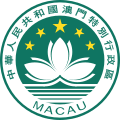History
When Macau was under Portuguese rule, there was a Brazilian consul but was closed shortly afterwards. [2] During the Second World War, when Macau was under Portuguese rule, there was a British consul, John Pownall Reeves, who served between June 1941 and August 1946. [3] He remained there following the fall of British-ruled Hong Kong to the Japanese, as Portugal was neutral, helping 9,000 British subjects who had become refugees from the Japanese-occupied colony. [4]
The British consulate, which also operated a Hong Kong Government Permit Office, was maintained in Macau until 1967, when, following political unrest the previous December, it was targeted by pro-Communist demonstrators who attempted to make the consul, Norman Ions, repeat anti-British and anti-Portuguese slogans, before it was evacuated and closed. [5]
Countries without missions
The following countries, which have diplomatic relations with the People's Republic of China, do not presently have representation in either Macau or Hong Kong, but have proposed establishing consulates:
The following countries, which have diplomatic relations with Taiwan, do not have consulates in Hong Kong or Macau, but has non-resident mission in other countries:
This page is based on this
Wikipedia article Text is available under the
CC BY-SA 4.0 license; additional terms may apply.
Images, videos and audio are available under their respective licenses.



